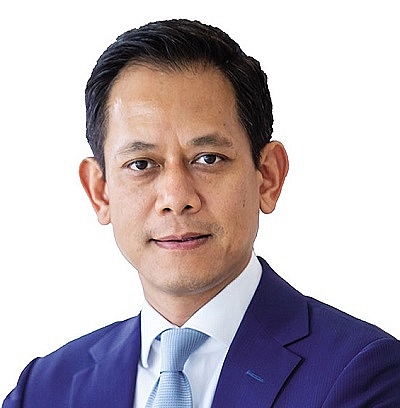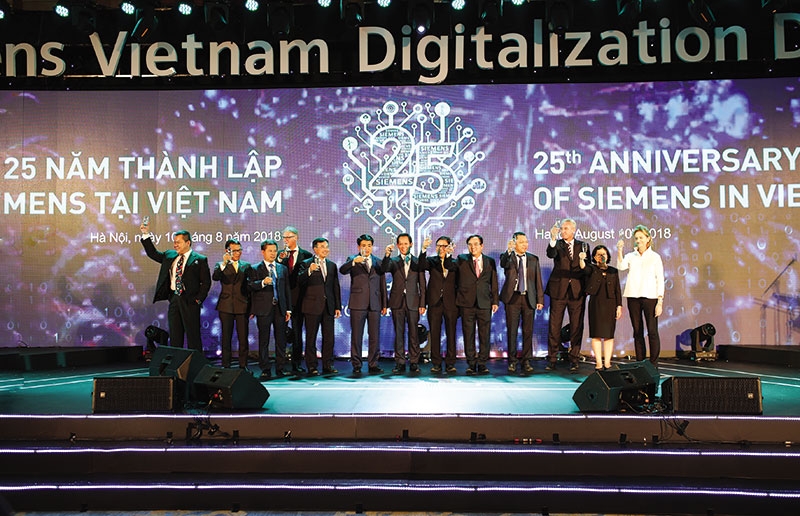Making real what matters to Vietnam
 |
| Pham Thai Lai |
Siemens was officially established in Vietnam in 1993, but its influence in the country dates back to 1979, when the company supplied and installed two industrial steam turbines at Bai Bang Paper Mill. Siemens now has three Vietnamese offices located in Hanoi, Danang, and Ho Chi Minh City, together with a manufacturing site in the southern province of Binh Duong.
Since our establishment, Siemens has successfully participated in numerous infrastructure projects within Vietnam and we are currently a market and innovation leader in the fields of power and gas, energy management, power generation services, mobility, building technologies, digital factory, process industries and drives, as well as in healthcare.
Siemens has been contributing extensively to the development of Vietnam’s energy sector and is helping to solve the threat of power shortages by participating in a number of important power projects, including the 740-megawatt Phu My 3 combined cycle power plant (CCPP), the 1,500MW Ca Mau 1 and 2 CCPP, and the 750MW Nhon Trach 2 CCPP.
In 2017, Siemens and Gamesa combined business ventures to shape the wind- energy landscape of tomorrow and to create one of the world’s largest wind power companies. Currently, Siemens Gamesa Renewable Energy is installing and commissioning the Dam Nai wind farm with 39 MW, with the completion target set to be mid-2019.
 |
| Last Friday in Hanoi, Siemens celebrated its 25th anniversary of official presence in Vietnam with about 300 stakeholders |
Last month, Siemens won a contract to supply systems to Trung Nam Group in Vietnam and to put the country’s largest solar farm into operation. The farm is Siemens’ first solar project in Southeast Asia, and has a capacity of 204 megawatts-peak. The project will deliver up to 425 gigawatt-hours per year. This is enough to supply approximately 200,000 households with electricity and saves around 250,000 tonnes of CO2.
Siemens is one of the leading suppliers of power transmission and distribution in Vietnam. Thousands of 110kV substations, hundreds of 220kV substation, and dozens of 500kV substations are being equipped with Siemens’ high-medium voltage products. Some of the 500kV substations include Doc Soi, Quang Ninh, Song May, and Son La.
We are also the leading company in the area of automation in Vietnam. Our automation solutions have helped customers in water treatment, food and beverage, paper, cement, machinery, chemical, metal, and other industries to assist in the enhancement of their productivity, energy efficiency, and flexibility, while at the same time mitigating the impact on the environment. For example, Siemens’ Totally Integrated Automation (TIA) helps Vietnamese customers reduce engineering time by 30-50 per cent, significantly decreasing costs and increasing energy savings. Siemens provides the integrated drive system for Thu Duc 3 Water Plant, helping to mitigate the water pressure for four outer districts and parts of two central districts in Ho Chi Minh City, especially during the dry season. Recently, we executed a modernisation process for Saigon New Port, which helps our clients to increase the efficiency of their operational fleet.
Siemens Building Technologies’ Building Management System (BMS), which has outstanding features in energy efficiency, security, safety, and convenience, has been installed in many large construction projects throughout Vietnam. These include Bitexco Financial Tower in Ho Chi Minh City, Hanoi Museum, and My Dinh National Stadium. Most recently, Siemens supplied the BMS and fire alarm system for the German House in Ho Chi Minh City–one of the most sustainable office buildings in Vietnam.
In terms of the mobility sector, Siemens has successfully implemented a number of projects, including the design and supply of 16 diesel-electric locomotives to Vietnam Railways, the supply of airfield lighting systems to Noi Bai Airport in Hanoi as well as Lien Khuong Airport in Lam Dong, and the provision of the material handling system to Tan Son Nhat Airport in Ho Chi Minh City. Siemens’ mass transit systems can help to address the growing demand for transportation in densely populated cities like Hanoi and Ho Chi Minh City, with Siemens Intelligent Transportation System assisting in reducing traffic problems in these cities.
Siemens Healthineers is considered the leading supplier of diagnostic and imaging equipment in the healthcare sector, providing high-quality medical services at an affordable price for hospitals and clinics in Vietnam, as well as enabling more efficient diagnoses and more effective treatments. Every year, thousands of doctors and healthcare practitioners are trained in clinical talks and continuing medical education courses organised by Siemens Healthineers.
Notably, Siemens AG has established a hub of qualified Vietnamese staff to work in site management, construction, commission, and quality control for Siemens power projects worldwide. So far, more than 20 Vietnamese engineers have been recruited and trained to work at 33 power plant projects in 19 countries worldwide.
Siemens commits to being a good corporate citizen in Vietnam. We advance engineering and manufacturing education and training in Vietnam by helping establish automation training centres, donating large amounts of equipment, and providing free software to many technical universities countrywide. In 2011, through the Higher Engineering Education Alliance Programme, Siemens provided software with a commercial value of $71 million for five technology-based universities in Vietnam. 200 Solid Edge licences have recently been granted by Siemens to Hanoi University of Science and Technology with a commercial value of approximately $6 million.
Siemens has also been supporting Vietnamese universities with training kits, curriculum development, technical workshops, and career talks, especially in introducing the Industry 4.0 concept. We are working closely with our customers to train and develop their workforce for the journey to becoming a digital enterprise. We’re also a thought leader on emerging topics such as Industry 4.0, sustainable energy, and smart cities. Last year, in co-operation with the Ministry of Industry and Trade and the German Embassy in Vietnam, we organised a series of conferences about these topics and attracted much attention from related stakeholders.
Over a period of nearly three decades, Siemens Vietnam has been receiving valuable support from the Vietnamese and German governments. Particularly, in July 2017, we had the honour to welcome Vietnamese Prime Minister Nguyen Xuan Phuc on a visit to our gas turbine factory in Berlin. This factory produces the largest gas turbines in the world, including those provided to Ca Mau 1 and 2 and Nhon Trach 2 power plants in Vietnam.
2018 marks an important milestone in our history in Vietnam as we celebrate our 25th anniversary of official presence. We are proud to be able to support Vietnam in improving the quality of life, propelling economic development, fostering human capital and innovation, and sustaining the environment. We have created sustainable values for our customers, for our employees, and society to build a better life for everybody. We make real what matters to Vietnam.
By Pham Thai Lai - President and CEO, Siemens Vietnam
What the stars mean:
★ Poor ★ ★ Promising ★★★ Good ★★★★ Very good ★★★★★ Exceptional
 Tag:
Tag:
Related Contents
Latest News
More News
- VinaCapital launches Vietnam's first two strategic-beta ETFs (February 26, 2026 | 09:00)
- PM sets five key tasks to accelerate sci-tech development (February 26, 2026 | 08:00)
- PM outlines new tasks for healthcare sector (February 25, 2026 | 16:00)
- Citi report finds global trade transformed by tariffs and AI (February 25, 2026 | 10:49)
- Vietnam sets ambitious dairy growth targets (February 24, 2026 | 18:00)
- Vietnam, New Zealand seek level-up in ties (February 19, 2026 | 18:06)
- Untapped potential in relations with Indonesia (February 19, 2026 | 17:56)
- German strengths match Vietnamese aspirations (February 19, 2026 | 17:40)
- Vietnam’s pivotal year for advancing sustainability (February 19, 2026 | 08:44)
- Strengthening the core role of industry and trade (February 19, 2026 | 08:35)






















 Mobile Version
Mobile Version